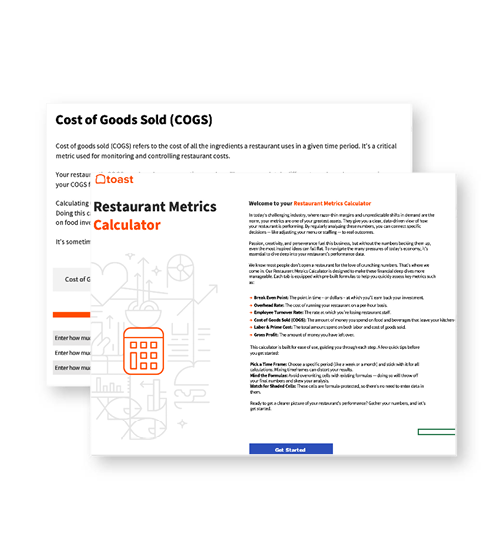
Selling a Restaurant: How to Sell a Restaurant Business
Selling a restaurant doesn’t have to be painful with our guide to pricing, listing, and closing the deal.
Grace JidounAuthor

Restaurant Metrics Calculator
Use this free calculator to calculate the key restaurant metrics needed to understand the health and success of your business.
Get Free Download | Built for Restaurants
| Built for RestaurantsHow to Sell a Restaurant Business: Guide to Find Restaurant Buyers
There may come a time in your journey when you need to sell your restaurant. Maybe business is booming, and you’re keen to capture a windfall. Perhaps you’d like to move on to a new concept or cuisine. Retirement, partnership disputes, divorce, low profitability, and plain old burnout are commonly cited reasons for hanging up the apron, so to speak.
No matter what the reasons, all restaurant owners — and all entrepreneurs for that matter — go through a similar process when selling. We won’t sugarcoat it; there’s way more to it than finding a buyer to sign on the dotted line.
You’ve heard it a thousand times before. The restaurant industry is a competitive environment, with an average profit margin of 5%, an average employee turnover of 75%, and a 17% failure rate in the first year of operation, according to Toast data. It will take a thoughtful and well-researched plan to find the right buyer.
As the legendary basketball coach Bobby Knight once said, “I don’t believe in luck, I believe in preparation.” Think of selling a restaurant as an exercise in organization. Coming into the process prepared will make all the difference. What does that mean? It’s equal parts analysis, action, and negotiation — with a heaping serving of number crunching on the side. You’ll need to determine the value of your business, polish up your finances, prepare your restaurant for sale, negotiate contracts, and, of course, hand over the keys (sometimes the most challenging part). In this article, we’ll walk you through the steps of selling a restaurant and provide guidance on when to call in the financial pros.
Preparing to Sell Your Restaurant
Most entrepreneurs are psyched to launch a restaurant, not sell it. So when they decide to sell, many do it at the wrong time or in the wrong way. To avoid such expensive mistakes, you can implement two key strategies from the outset.
Assess your reasons for selling
First, take a moment and reflect on your reasons for selling. The goal is to honestly reflect on your reasons and, more importantly, your expectations for the sale. Jot down your findings and solicit feedback from a trusted friend or business consultant with industry experience. Without a reality check, no amount of marketing, networking, and negotiating will get you to where you want to be.
Evaluate the financial health of your restaurant
What could be more important than knowing where you want to be? The answer: Take a hard look at where you are right now. Gaining financial clarity before you sell is key. Luckily, there is a tried-and-true method called the SWOT Analysis. It is a powerful framework that evaluates a business’s financial health from four perspectives: strengths, weaknesses, opportunities, and threats.
To get started, collect all your restaurant’s financial records and statements from the past five years. To assess using SWOT, ask yourself these simple questions: What is working for my restaurant (strengths)? What’s not working (weaknesses)? What are growth opportunities my restaurant can capitalize on (opportunities)? What external factors can harm my restaurant (threats)? Dive deeper into this strategy with our article, How to Prepare a Restaurant SWOT Analysis.
Determine the Value of Your Restaurant
Determining the value of your restaurant is tricky business as no two are worth the exact same amount of money. Location, technology, neighborhood competition, supply chains, the national economy, and market trends are all factors that impact your restaurant’s worth in the eyes of buyers. Getting this right is crucial, as you can’t demand a reasonable asking price without accurate information.
Work with a professional appraiser
A professional appraiser on your team will be worth their weight in gold, as they can do all the heavy lifting for you. A good appraiser will have their finger on the pulse of current market trends and conditions to provide an accurate valuation. Beyond just your brand, you’ll need to know the value of your business assets (cooking equipment, furniture, décor, technology) as well as the value of the buildings and land owned by your restaurant, which will require their own appraisers. The more professional valuation information you have at your fingertips, the stronger your case will be when you’re at the negotiating table.
Evaluate market conditions and trends
As someone immersed in the culinary world, you’re likely already on top of market conditions. Even so, food trends change faster than you can peel a potato, so brushing up on your restaurant and market analysis techniques is a good idea. You’ll gain insight into how your restaurant fits into the current overall market (not where you stood last year or the year before), which will come in handy during the next steps of the selling process.
Preparing Your Restaurant for Sale
Now that you know your current value, you can set the wheels in motion for the sale. It’s important to get all aspects of your restaurant in tip-top shape before you put it on the market, from sprucing up the physical appearance to buttoning up your financial and legal documents.
Find a broker (or decide to do it yourself!)
Perhaps you’re a seasoned restauranteur who buys and sells frequently. In this case, you might want to act as your own broker. But remember, you only have one shot to get it right. There are many complex moving parts to consider: brokers will hype up your restaurant, vet and qualify prospective buyers, negotiate prices, facilitate the process of due diligence, and more. This is why even veteran restauranteurs turn to brokers.
Enhance curb appeal and update equipment and technology
Just like with a fixer-upper house, if the paint is chipped, the signage is broken, and the point-of-sale tech is clunky, you won’t be able to entice as many potential buyers. Likewise, outdated cooking equipment and dusty décor are just plain old unappetizing. Updating your equipment and implementing a technology upgrade will make your restaurant all the more attractive to buyers.
Organize financial and operational documentation
Are your important financial statements messier than a stack of barbecued baby back ribs? Now is the time to clean up your accounting software, prepare financial statements, resolve any outstanding liabilities, and organize any other fundamental financial metrics.
Resolve any outstanding legal or regulatory issues
If there’s one area that can sink a deal before it even gets started, it’s this. Even if you don’t need to make substantial changes, it’s best to begin reviewing documentation as soon as possible. Ensure all leases are in good order, all taxes have been paid, and there are no liens against any assets that have not been disclosed. Your financial and operational documentation should be clean and up-to-date. You may consider an independent audit of your financials to ease any worries for potential buyers.
Negotiating, Closing the Sale, and Transitioning Ownership
Create an Attractive and Engaging Listing
This is where your market research comes into play. What makes your restaurant memorable and different from all the rest? When creating your listing, you’ll need to be savvy about what investors look for in a restaurant, what motivates them to buy, and what kind of information they are most interested in. For inspiration, check out other restaurants for sale on sites like BizBuySell, BizQuest, and BusinessBroker.net.
Leverage Industry Networks and Connections
That old business adage rings true: It’s all about who you know — and who knows you. Now’s the time to leverage the connections you’ve made throughout your career. Get the word out through your network (including friends and family) that you’re looking for buyers, as the right person may not be who you’d expect. Take a multi-pronged approach to networking, mixing in-person events with social media and email — and don’t dismiss the impact of picking up the phone for a good old-fashioned conversation! Building relationships with potential restaurant buyers will not happen overnight. It might involve dinners, discussing your business over coffee, or hanging out at other restaurants. It’s essential to build trust, and that requires an investment of time.
Conduct Due Diligence on Potential Buyers
Just as the buyer will do their due diligence on your business, you should also investigate potential buyers. You will want to make sure someone not only has the money to buy your restaurant, but will also be able to run it successfully. This entails a review of all their financial documents, including credit reports, income tax returns, and liabilities such as rent on other properties and monthly expenses. Don’t be shy about running a background check on potential buyers or asking for personal and professional references. Additionally, ask to see their business plan so you can be sure they have a solid roadmap to success.
Negotiate Price, Terms, and Contingencies
If you’ve hired a broker, this is their opportunity to shine and demonstrate their value. They’ll negotiate the price (and hopefully spark a bidding war), finalize the terms of the agreement, and negotiate contingencies (conditions that the buyer demands be met before moving forward).
Finalize the Sale and Transfer Ownership
It can take months to close a deal, and a lot can happen during that time. It’s essential to stay focused and not spend your profits (or take off for Cabo!) until the deal is officially closed. You’ll still need to hit profitability goals and other financial metrics while in limbo. And there are important loose ends to tie up, such as customers (how will they be informed?), employees (who will stay and who will go?), contracts with vendors (who will notify them?), and more. Consider this time “business as usual” until the sale is complete.
Now comes the final step: transferring the ownership rights of your business to the buyer. There are a few options to consider. You can do an outright sale, a gradual sale (with a payment plan), or a lease agreement, where you transfer ownership through a lease. That said, many sellers prefer an outright sale to be paid in full on closing, whether in cash or through a small business loan. You’ll want to check with your state’s guidelines regarding registering the sale with tax agencies and other legal obligations.
A restaurant is more than the sum of its parts. You’re selling an exciting idea, an experience diners cherish, and a place where memories are made. How can you put a dollar amount on that? The only way to determine a fair price is by doing your due diligence and taking it one step at a time.
Is this article helpful?
DISCLAIMER: This information is provided for general informational purposes only, and publication does not constitute an endorsement. Toast does not warrant the accuracy or completeness of any information, text, graphics, links, or other items contained within this content. Toast does not guarantee you will achieve any specific results if you follow any advice herein. It may be advisable for you to consult with a professional such as a lawyer, accountant, or business advisor for advice specific to your situation.
Read More
Subscribe to On the Line
Sign up to get industry intel, advice, tools, and honest takes from real people tackling their restaurants’ greatest challenges.
By submitting, you agree to receive marketing emails from Toast. We’ll handle your info according to our privacy statement. Additional information for California residents available here


